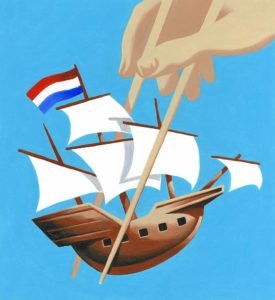WSJ Historically Speaking: The Risks of Trading Abroad, From Mesopotamia to Apple

ILLUSTRATION: THOMAS FUCHS
Doing business overseas has put many enterprises on the road to making big money—but it can also be a quick way to lose a lot. Apple is vigorously fighting a bill for $14.5 billion in back taxes that the European Union says it owes Ireland. The iPhone maker will survive whatever happens, but the dispute illustrates the risks that businesses face when dealing with foreign governments. It’s a challenge that has grown more serious in recent years with the rise of aggressive nationalism in many countries.
In much of the ancient world, the presence of foreign merchants was regarded as a boon. During the third millennium B.C., the Mesopotamian ruler Sargon the Great boasted of his modern port facilities and the international trade that they attracted. The ancient Greeks went further and built specially protected ports for trade. There, taxes were low and legal rights were guaranteed, and foreigners could enter into contracts with confidence. Such arrangements enabled the Greeks to profit from extensive long-distance trading networks and proved inspirational to the Romans.
The atmosphere for international business declined sharply after the collapse of the Roman empire in the fifth century. Setting up shop abroad became more dangerous. Consider the fate of the 14th-century merchants from Genoa, Italy, who controlled the Crimean port of Kaffa, now Feodosia, on the Black Sea. In the late 1340s, the Mongol overlords of the region drove the Genoese out of their commercial enclave by lobbing plague victims over the fortress walls. The survivors fled back to Genoa, bringing the Black Death with them and hastening its advance.
The next great wave of international trade, during the Age of Discovery, produced a generation of traders who were intensely security- conscious. The Dutch formed the United East Indian Co. in 1602 and granted it extraordinary powers, including the right to wage war and negotiate international treaties. But the company soon ran into difficulties. In 1662, the Dutch possession of Formosa (modern Taiwan) ended with a violent takeover by the Chinese. They massacred some of the merchants living on the island and enslaved many of their wives and daughters. Over succeeding centuries, the Dutch experience became depressingly familiar among international trading communities, particularly in times of war.
By the 20th century, foreign businesses were more likely to fall by the pen than by the sword, although that didn’t make their position any more secure. The energy industry has been especially vulnerable to the politics of national ownership versus private enterprise.
At the start of World War I, the oil company Branobel was a major owner of the Baku oil fields in Azerbaijan. (Company co-founder Ludvig Nobel was the older brother of Alfred, who created the Nobel Prize.) Branobel lost the fields to the Bolsheviks in June 1918, who in turn lost them to the Turks in September. Two months later, it was Britain’s turn to take control, and it restored the fields to Branobel. But in 1920 the Bolsheviks were back, and this time they played for keeps.
Expropriators rarely have to compensate their victims. International justice being what it is, it’s unlikely that Egypt, which nationalized the Suez Canal in 1956, will ever return the waterway to the company that ran it for almost a century. Nor is it likely, despite the recent opening to Cuba, that the U.S. businesses and properties seized by Fidel Castro will ever find their way home. Valued at almost $2 billion decades ago, accumulated interest now makes these claims worth far more.
The only solution to the global penchant for ganging up against international companies may be time—and the pinch of lost trade. To paraphrase what Britain’s former Prime Minister Margaret Thatcher said about socialism, the problem with abusing foreign business is that eventually you run out of other people’s money.
